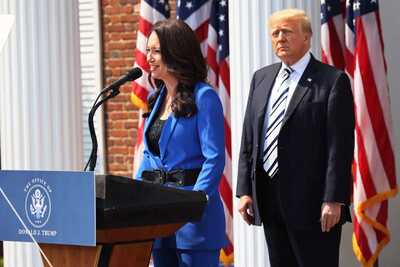 US Agriculture Secretary Brooke Rollins (left). Photo: Michael M. Santiago/Getty ImagesBloomberg | 8 July 2025
US Agriculture Secretary Brooke Rollins (left). Photo: Michael M. Santiago/Getty ImagesBloomberg | 8 July 2025US acts on foreign ownership of farmland amid China tension
By Ilena Peng
The USDA is partnering with the Treasury Department's Committee on Foreign Investment in the United States to review foreign purchases involving the farming industry.
The Trump administration is tightening its grip on foreign ownership of farmland amid continuing concerns over Chinese investment in America’s heartland.
The US Department of Agriculture will work with state lawmakers to end farmland purchases “by nationals for countries of concern or other foreign adversaries,” according to a press event Tuesday. The USDA is also partnering with the Treasury Department’s Committee on Foreign Investment in the United States, or CFIUS, to review foreign purchases involving the farming industry.
US farms are “under threat from criminals, from political adversaries and from hostile regimes that understand our way of life as a profound and existential threat to themselves,” Agriculture Secretary Brooke Rollins said at the event. Rollins said she is officially part of CFIUS as of Tuesday.
The move comes as US-China tensions have reverberated across state and local politics in Middle America in recent years, sowing angst about Chinese investment. Lawmakers on both sides of the political aisle have long raised concerns that foreign farmland ownership threaten food and national security, and roughly half of US states bar non-resident or foreign-owned entities from owning farmland, according to the National Agricultural Law Center.
In 2023, a unit of seed company Syngenta AG was given two years to divest 160 acres of farmland in Arkansas. That enforcement action against Syngenta, which was acquired by China National Chemical Corp., was the first taken under legislation signed by Republican Governor Sarah Huckabee Sanders banning prohibited foreign entities from owning agricultural lands in the state.
In a similar development, a $700 million corn mill project in Grand Forks, North Dakota, was scrapped in 2023 after facing growing opposition from local politicians over its Chinese owner.
Companies such as Syngenta and Smithfield Foods Inc., owned by China’s WH Group, are among the owners of American farmlands that have raised concerns among officials. Peter Navarro, the counselor to the president, said the acquisition of Smithfield in 2013 “really troubled” him, and that seeds like those sold by Syngenta “can be the revolution that keeps the world fed, and China now owns a key part of that.”
Syngenta is already in the process of selling its remaining farmland in the US and currently owns fewer than 1,000 agricultural acres, a company spokesperson said Tuesday. That land has been used for testing products locally because, for example, “testing soybeans in Wisconsin does not guarantee they will be the best option for soybean producers in Georgia,” the spokesperson said.
Smithfield Foods has sold more than a third of its US farmland since 2013 and now owns about 85,000 acres, a number that “continues to decline,” a spokesperson said. He added that WH Group is not a Chinese state-owned enterprise and that CFIUS approved its acquisition of Smithfield.
Foreign-held farmland expanded to nearly 45 million acres as of 2023, though that is only about 3.5% of all US privately-held farmland, according to the USDA. More than a third of that acreage is owned by Canadian investors. China held nearly 280,000 acres in 2023, slightly less than 1% of foreign-held acres.
The so-called National Farm Security Action Plan unveiled Tuesday raises the fine for late and false filings on foreign farm investments to 25%, and creates a new portal for reporting filing violations. Other pillars of the plan include evaluating USDA-funded research for foreign participation, including the elimination of all program agreements going to so-called foreign adversaries.
The USDA has already canceled seven agreements with entities in foreign countries of concern and will continue to do so, Rollins said. She said she also signed a memorandum removing 70 citizens of such countries who were affiliated with the USDA through contracts or research arrangements.
Also speaking at the event with Rollins were Defense Secretary Pete Hegseth, Attorney General Pam Bondi and Homeland Security Secretary Kristi Noem. State governors including from Arkansas, Nebraska and Tennessee were also in attendance.













